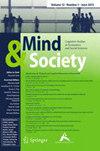Influence of Spiritual intelligence on Happiness and Well being: A Review
Q1 Arts and Humanities
引用次数: 0
Abstract
Mental health is an ineluctable topic of conversation during unprecedented pandemic or natural disasters. Studies show that improving Spiritual intelligence (SI) can improve everyone’s mental health. Problem-solving, meaning and purpose in life, overall well-being, resilience, and good intrapersonal and interpersonal relationships are all areas where spiritual intelligence can be employed. As Spiritual Intelligence is a key part of every human being, it focuses on numerous good results. SI is sometimes known as a spiritual quotient. Spiritual intelligence has an inevitable role in the life of every individual. It influences all stages of existence and increases mental health for one’s personal and professional progress. SI is also a helpful tool for a healthy lifestyle since it helps people to cope with stressful situations and recover from traumatic events. This article concludes that students, employees, and professionals need spiritual intelligence training to deal with challenging situations. Self-awareness and spiritual intelligence can be nurtured through mindfulness, psychotherapy, yoga, meditation, and psychoeducation. The necessities of psychological interventions are unavoidable in this present pandemic situation. Many research studies stress the importance of mental health and the need for appropriate mental health interventions.精神智力对幸福和幸福的影响:综述
在前所未有的流行病或自然灾害中,心理健康是一个不可避免的话题。研究表明,提高精神智力(SI)可以改善每个人的心理健康。解决问题、生活的意义和目的、整体幸福感、适应力、良好的内省和人际关系都是精神智力可以运用的领域。由于灵性智能是每个人的关键部分,它关注于许多好的结果。SI有时被称为精神商。精神智力在每个人的生活中都有不可避免的作用。它影响人生的各个阶段,促进个人和职业发展的心理健康。自虐也是健康生活方式的有用工具,因为它可以帮助人们应对压力情况并从创伤事件中恢复过来。这篇文章的结论是,学生、雇员和专业人士需要精神智力训练来处理具有挑战性的情况。自我意识和精神智力可以通过正念、心理治疗、瑜伽、冥想和心理教育来培养。在目前这种流行病的情况下,心理干预的必要性是不可避免的。许多研究都强调心理健康的重要性和采取适当健康干预措施的必要性。
本文章由计算机程序翻译,如有差异,请以英文原文为准。
求助全文
约1分钟内获得全文
求助全文
来源期刊

Mind and Society
Arts and Humanities-Philosophy
CiteScore
2.30
自引率
0.00%
发文量
5
期刊介绍:
Mind & Society is a journal for ideas, explorations, investigations and discussions on the interaction between the human mind and the societal environments. Scholars from all fields of inquiry who entertain and examine various aspects of these interactions are warmly invited to submit their work. The journal welcomes case studies, theoretical analysis and modeling, data analysis and reports (quantitative and qualitative) that can offer insight into existing frameworks or offer views and reason for the promise of new directions for the study of interaction between the mind and the society. The potential contributors are particularly encouraged to carefully consider the impact of their work on societal functions in private and public sectors, and to dedicate part of their discussion to an explicit clarification of such, existing or potential, implications.Officially cited as: Mind Soc
 求助内容:
求助内容: 应助结果提醒方式:
应助结果提醒方式:


